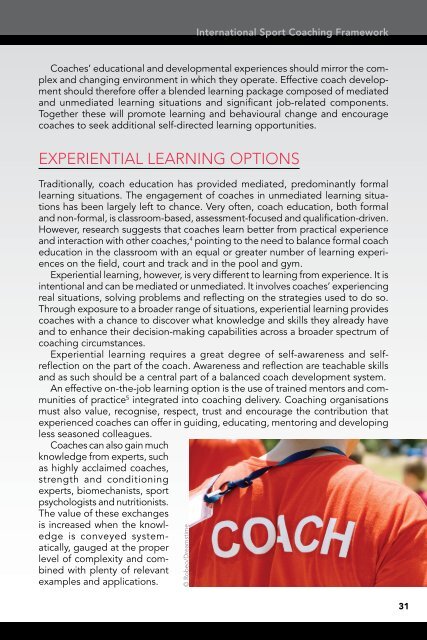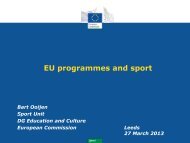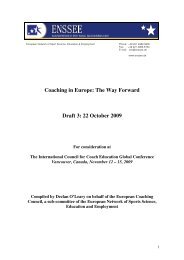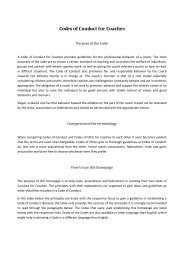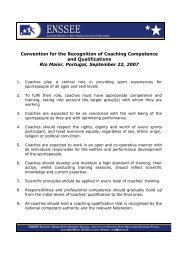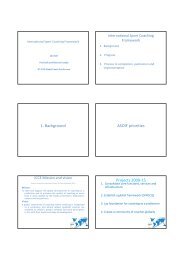International Sport Coaching Framework â version 1.1
International Sport Coaching Framework â version 1.1
International Sport Coaching Framework â version 1.1
You also want an ePaper? Increase the reach of your titles
YUMPU automatically turns print PDFs into web optimized ePapers that Google loves.
<strong>International</strong> <strong>Sport</strong> <strong>Coaching</strong> <strong>Framework</strong><br />
Coaches’ educational and developmental experiences should mirror the complex<br />
and changing environment in which they operate. Effective coach development<br />
should therefore offer a blended learning package composed of mediated<br />
and unmediated learning situations and significant job-related components.<br />
Together these will promote learning and behavioural change and encourage<br />
coaches to seek additional self-directed learning opportunities.<br />
EXPERIENTIAL LEARNING OPTIONS<br />
Traditionally, coach education has provided mediated, predominantly formal<br />
learning situations. The engagement of coaches in unmediated learning situations<br />
has been largely left to chance. Very often, coach education, both formal<br />
and non-formal, is classroom-based, assessment-focused and qualification-driven.<br />
However, research suggests that coaches learn better from practical experience<br />
and interaction with other coaches, 4 pointing to the need to balance formal coach<br />
education in the classroom with an equal or greater number of learning experiences<br />
on the field, court and track and in the pool and gym.<br />
Experiential learning, however, is very different to learning from experience. It is<br />
intentional and can be mediated or unmediated. It involves coaches’ experiencing<br />
real situations, solving problems and reflecting on the strategies used to do so.<br />
Through exposure to a broader range of situations, experiential learning provides<br />
coaches with a chance to discover what knowledge and skills they already have<br />
and to enhance their decision-making capabilities across a broader spectrum of<br />
coaching circumstances.<br />
Experiential learning requires a great degree of self-awareness and selfreflection<br />
on the part of the coach. Awareness and reflection are teachable skills<br />
and as such should be a central part of a balanced coach development system.<br />
An effective on-the-job learning option is the use of trained mentors and communities<br />
of practice 5 integrated into coaching delivery. <strong>Coaching</strong> organisations<br />
must also value, recognise, respect, trust and encourage the contribution that<br />
experienced coaches can offer in guiding, educating, mentoring and developing<br />
less seasoned colleagues.<br />
Coaches can also gain much<br />
knowledge from experts, such<br />
as highly acclaimed coaches,<br />
strength and conditioning<br />
experts, biomechanists, sport<br />
psychologists and nutritionists.<br />
The value of these exchanges<br />
is increased when the knowledge<br />
is conveyed systematically,<br />
gauged at the proper<br />
level of complexity and combined<br />
with plenty of relevant<br />
examples and applications.<br />
© Robeo/Dreamstime<br />
31


